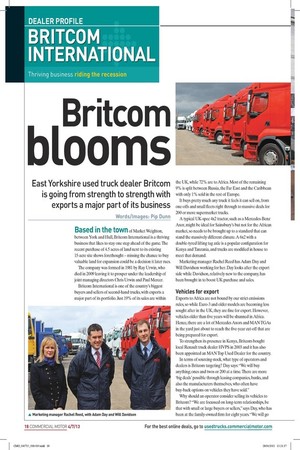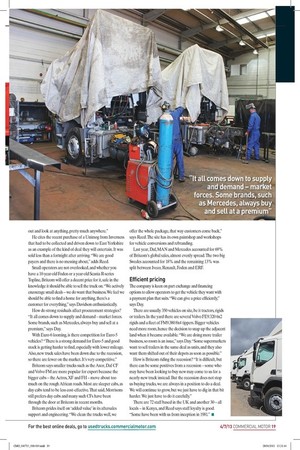DEALER PROFILE BRITCOM INTERNATIONAL Thriving business riding the recession Britcom
Page 14

Page 15

If you've noticed an error in this article please click here to report it so we can fix it.
blooms East Yorkshire used truck dealer Britcom is going from strength to strength with exports a major part of its business Words/Images: Pip Dunn Based in the town of Market Weighton, between York and Hull, Britcom International is a thriving business that likes to stay one step ahead of the game. The recent purchase of 4.5 acres of land next to its existing 15-acre site shows forethought — missing the chance to buy valuable land for expansion could be a decision it later rues.
The company was formed in 1981 by Ray Urwin, who died in 2009 leaving it to prosper under the leadership of joint managing directors Chris Urwin and Paul Mercer.
Britcom International is one of the country's biggest buyers and sellers of second-hand trucks, with exports a major part of its portfolio. Just 19% of its sales are within the UK, while 72% are to Africa. Most of the remaining 9% is split between Russia, the Far East and the Caribbean with only 1% sold in the rest of Europe.
It buys pretty much any truck it feels it can sell on, from one-offs and small fleets right through to massive deals for 200 or more supermarket trucks.
A typical UK-spec 4x2 tractor, such as a Mercedes-Benz Axor, might be ideal for Sainsbury's but not for the African market, so needs to be brought up to a standard that can stand the massively different climate. A 6x2 with a double-tyred lifting tag axle is a popular configuration for Kenya and Tanzania, and trucks are modified in house to meet that demand.
Marketing manager Rachel Reed has Adam Day and Will Davidson working for her. Day looks after the export side while Davidson, relatively new to the company, has been brought in to boost UK purchase and sales.
Vehicles for export Exports to Africa are not bound by our strict emissions rules, so while Euro-3 and older models are becoming less sought after in the UK, they are fine for export. However, vehicles older than five years will be shunned in Africa. Hence, there are a lot of Mercedes Axors and MAN TGAs in the yard just about to reach the five-year cut-off that are being prepared for export.
To strengthen its presence in Kenya, Britcom bought local Renault truck dealer HVPS in 2003 and it has also been appointed an MAN Top Used Dealer for the country.
In terms of sourcing stock, what type of operators and dealers is Britcom targeting? Day says: "We will buy anything; ones and twos or 200 at a time. There are more 'big deals' possible through leasing companies, banks, and also the manufacturers themselves, who often have buy-back options on vehicles they have sold."
Why should an operator consider selling its vehicles to Britcom? "We are focussed on long-term relationships, be that with small or large buyers or sellers," says Day, who has been at the family-owned firm for eight years. "We will go out and look at anything, pretty much anywhere."
He cites the recent purchase of a Unimog from Inverness that had to be collected and driven down to East Yorkshire as an example of the kind of deal they will entertain. It was sold less than a fortnight after arriving. "We are good payers and there is no messing about," adds Reed.
Small operators are not overlooked, and whether you have a 10-year-old Foden or a year-old Scania R-series Topline, Britcom will offer a decent price for it, safe in the knowledge it should be able to sell the truck on. "We actively encourage small deals — we do want that business. We feel we should be able to find a home for anything, there's a customer for everything," says Davidson enthusiastically.
How do strong residuals affect procurement strategies? "It all comes down to supply and demand — market forces. Some brands, such as Mercedes, always buy and sell at a premium," says Day.
With Euro-6 looming, is there competition for Euro-5 vehicles? "There is a strong demand for Euro-5 and good stock is getting harder to find, especially with lower mileage. Also, new truck sales have been down due to the recession, so there are fewer on the market. It's very competitive."
Britcom says smaller trucks such as the Axor, Daf CF and Volvo FM are more popular for export because the bigger cabs — the Actros, XF and FH — move about too much on the rough African roads. Most are sleeper cabs, as day cabs tend to be less cost-effective. That said, Mon-isons still prefers day cabs and many such CFs have been through the door at Britcom in recent months.
Britcom prides itself on 'added value' in its aftersales support and engineering. "We clean the trucks well, we offer the whole package, that way customers come back," says Reed. The site has its own paintshop and workshops for vehicle conversions and rebranding.
Last year, Daf, MAN and Mercedes accounted for 69% of Britcom's global sales, almost evenly spread. The two big Swedes accounted for 18% and the remaining 13% was split between Iveco, Renault, Foden and ERE Efficient pricing The company is keen on part exchange and financing options to allow operators to get the vehicle they want with a payment plan that suits. "We can give a price efficiently," says Day There are usually 350 vehicles on site, be it tractors, rigids or trailers. In the yard there are several Volvo FE9.320 6x2 rigids and a fleet of FM9.380 8x4 tippers. Bigger vehicles need more room, hence the decision to snap up the adjacent land when it became available. "We are doing more trailer business, so room is an issue," says Day. "Some supermarkets want to sell trailers in the same deal as units, and they also want them shifted out of their depots as soon as possible."
How is Britcom riding the recession? "It is difficult, but there can be some positives from a recession — some who may have been looking to buy new may come to us for a nearly-new truck instead. But the recession does not stop us buying trucks, we are always in a position to do a deal. We will continue to grow, but we just have to dig in that bit harder. We just have to do it carefully."
There are 72 staff based in the UK and another 30— all locals — in Kenya, and Reed says staff loyalty is good. "Some have been with us from inception in 1981" •









































